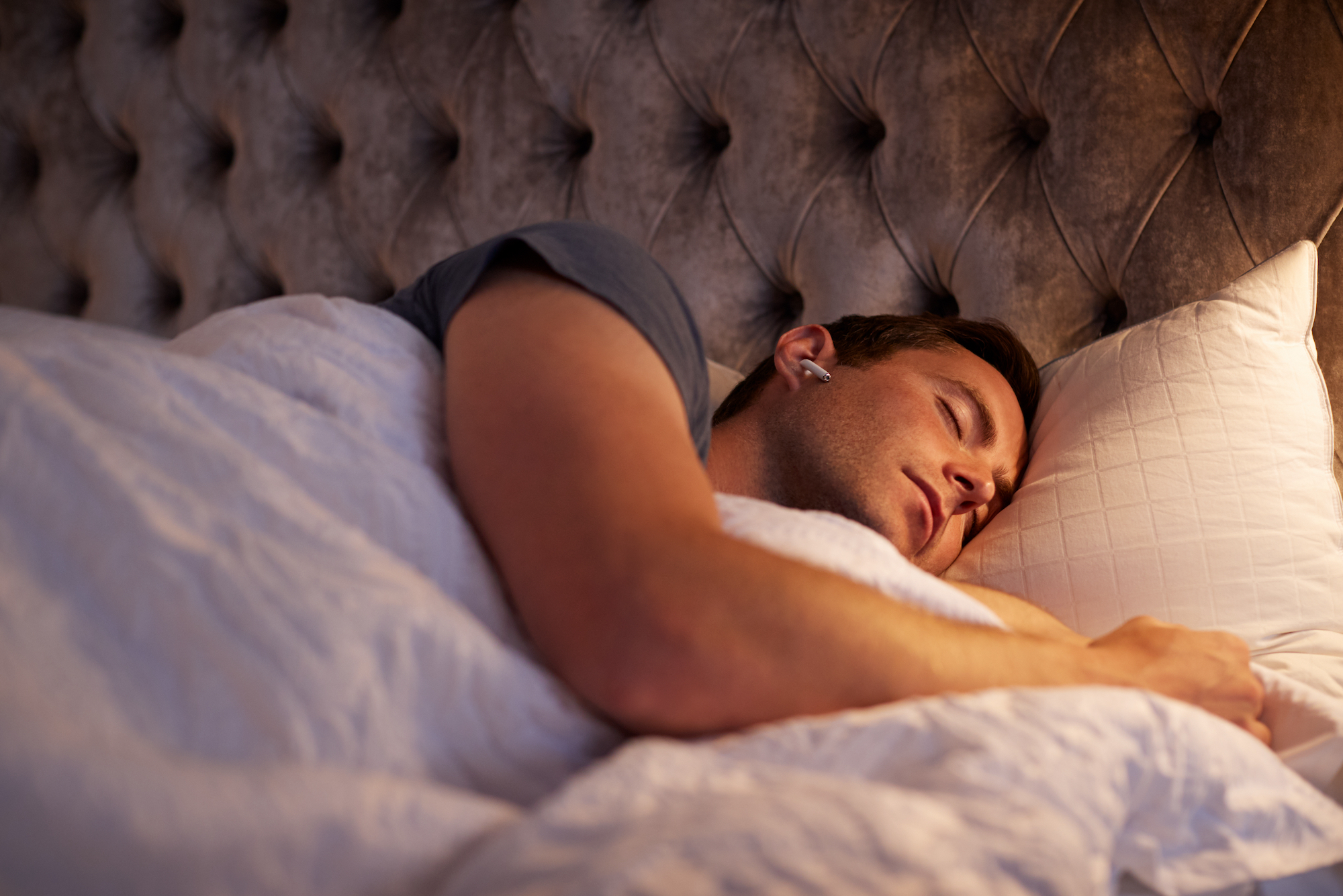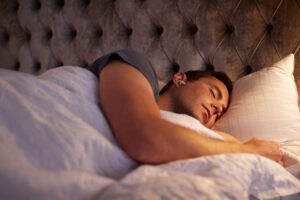At a Glance
- 52% of surveyed adults say they rely on background noise to sleep.
- 40.4% of adults who rely on noise to sleep use music, while 40.1% use nature sounds.
- Adults who rely on noise to sleep are 144.9% more likely to report poor sleep than those who don’t use noise.
- How many people use an air conditioner or fan to fall asleep? 34.1% of adults who rely on background noise do.
- 37.2% of parents say their children need some sort of background noise to sleep.
- Adults who rely on noise to sleep average 28 minutes less sleep each night than those who don’t rely on it.
“I cannot stand sleeping in total silence,” says Sarah Netter, 43, a New Orleans copywriter who turns on white noise at bedtime.
“It helps lull me to sleep,” she says. “I’m a light sleeper, so it also helps mask noises that might otherwise wake me up, like the dogs fidgeting or traffic noises.”
As a child, Netter had an air filter in her bedroom to alleviate allergies and asthma. She’s continued to use one as an adult, relying on the ambient background noise for sleep.
Like Netter, more than half of U.S. adults (52%) say they need some sort of background noise to help them sleep at night, according to an April 2023 survey of U.S. adults by The Sleep Doctor.
Among people who use noise to sleep, 40.4% prefer music as their top choice, 40.1% like nature sounds, and 38.1% use white noise from an app or machine. Others depend on a fan or air conditioner (34.3%), and a third of folks (33.3%) fall asleep to TV sounds. Some 17.6% use autonomous sensory meridian response sounds (ASMR). And more than one-third of parents say their kids need noise to sleep.
Does any of this noise help solve underlying sleep issues? Not necessarily, says Dr. Michael J. Breus, Ph.D., of The Sleep Doctor.
“Insomnia is complicated,” says Dr. Breus, who cautions people about overestimating the power of background noise. “Sticking a sound machine in your room is not going to fix it.”
Using noise to help us sleep instead might be something to approach strategically, with an eye on what benefits it can provide at bedtime and throughout the night.
What Noise Is Good for Sleep?
One review of 38 different studies on sleep and noise found that we don’t have enough evidence to say whether continuous noise is helpful. But it may depend on the type of noise we use for sleep.
We often refer to white noise as background noise, but there are many shades of noise, including pink and even brown noise. Some may work better for sleep than others, based on your preference.
White noise contains all frequencies of sound in equal measure. Pink noise has a lower-pitched sound and is similar to that of a waterfall. Brown noise also emphasizes lower frequencies, with examples including the sound of rainfall or a shower.
Among survey respondents who say they need noise to help them sleep, 38.1% opt for white noise from an app or sound machine, while 14.7% prefer pink noise, and 13.8% listen to brown noise.
Which is best? It depends.
Each may serve a different purpose for different people. The lower frequencies of pink and brown noise can be calming for some people, stress-inducing for others, and not heard at all by people with hearing loss in that range. And some things may always jar you awake, from commotion in the hallway outside your hotel room to a tree falling on your house.
“If it’s very quiet, and then all of a sudden, there’s a [loud] sound, you’re going to wake up,” Dr. Breus says. “Your brain will say, ‘What is that?’”
A 2021 Cornell University study did find that white noise significantly improved sleep for people in New York City who are frequently exposed to elevated noise levels. This may come from white noise’s ability to “block” various types of noise. Additional research found that pink noise improved deep sleep, which helps us feel refreshed and may even improve brain activity.
Although there’s less research on the effects of brown noise, videos describing or playing brown noise have gained millions of views on TikTok and YouTube in recent years.
So Who Is Using Noise To Sleep?
More than half of men (54.3%) say they need some kind of noise to fall asleep, compared to 47.5% of women. A higher percentage of men prefer music in the background when sleeping (40.8%) compared to women (39.5%). The opposite is true of nature sounds, which 40.5% of women prefer compared to 39.9% of men.

Is it helping? In some cases, the perception that noise helps us sleep may outweigh reality.
According to the survey, adults who depend on background noise to sleep tend to have more interrupted and lower-quality sleep than average, suggesting they may be turning to noise for help. Compared to adults who don’t rely on noise to sleep, these people wake up 22.2% more during the night and are 144.9% more likely to report “poor” sleep. They are also 10.5% more likely to seek professional medical help for sleep and are 11% more likely to use prescription drugs to help them sleep.
Then there’s length: Survey respondents who rely on background noise sleep 28 minutes less each night than those who don’t and 10 minutes less than average.
But even that might be a gain for people like Anna Rollins of Huntington, West Virginia, who started using a phone app to play ocean sounds to mask her husband’s snoring a few years ago.
“It was the only thing that would keep me from waking up,” says Rollins, 34.
Having a snoring bed partner is a case in which background noise may improve sleep quality, Dr. Breus says. A noise machine in a slightly noisy environment can mask or muffle the abrupt sounds that may otherwise startle you awake, making your room a more optimal sleep environment.
Dr. Breus suggests trying out different options to find out what works best for you. But there is such a thing as too much noise: “You shouldn’t have anything too close to your head,” he says.
Noise machines can potentially damage hearing if they’re too loud or too close to someone’s ears. The same can be said if you prefer plugging in your earbuds for some tunes before bed. Sound is measured in decibels (dB), and prolonged noises above 70 decibels can start to damage an adult’s hearing. Sound level meter apps can help you determine what’s safe.
Background Noise for Babies and Sleep
For babies, the safe level decreases to 50 decibels, according to the American Academy of Pediatrics. That’s roughly the volume of a quiet conversation or a humming refrigerator. It may be on the low end for a white-noise machine. But studies also have shown that white noise may help infants sleep.
So it’s a balancing act for the 37.2% of parents who say their children need some sort of background noise to slumber soundly. White noise from a noise machine or app is their most popular choice (45.3%), followed by music (40.1%) and nature sounds (39.2%).
Rollins says she used a noise machine to help her infant son sleep, and he has outgrown it by age 4. Meanwhile, after Netter’s son was born, she immediately introduced him to a noise machine. Nine years later, he still uses one to fall asleep every night.
There are potential downsides to parents using noise machines, says April Benasich, Ph.D., a neuroscientist and the director of the Infancy Studies Laboratory at Rutgers University in Newark, New Jersey.
“For adults, [white noise] is probably fine, but for a developing brain, it’s not the best,” says Benasich, adding that by blocking babies’ ability to listen to people’s conversations and other sounds, white noise may actually hinder language development. “Plenty of alternatives can help a baby sleep, including music, lullabies, and nature soundscapes.”
Netter adds that she and her wife aren’t thrilled relying on white noise to sleep. But sometimes, routine is routine.
“It’s here to stay,” she says.
Methodology
The survey commissioned by The Sleep Doctor was conducted on the online survey platform Pollfish on April 17, 2023. Results are from 1,200 survey participants in the United States who were ages 18 and older at the time of the survey and parents or guardians of at least one child. All respondents attested to answering the survey questions truthfully and accurately.
References
Ask the Sleep Doctor
Have questions about sleep? Submit them here! We use your questions to help us decide topics for articles, videos, and newsletters. We try to answer as many questions as possible. You can also send us an email. Please note, we cannot provide specific medical advice, and always recommend you contact your doctor for any medical matters.


